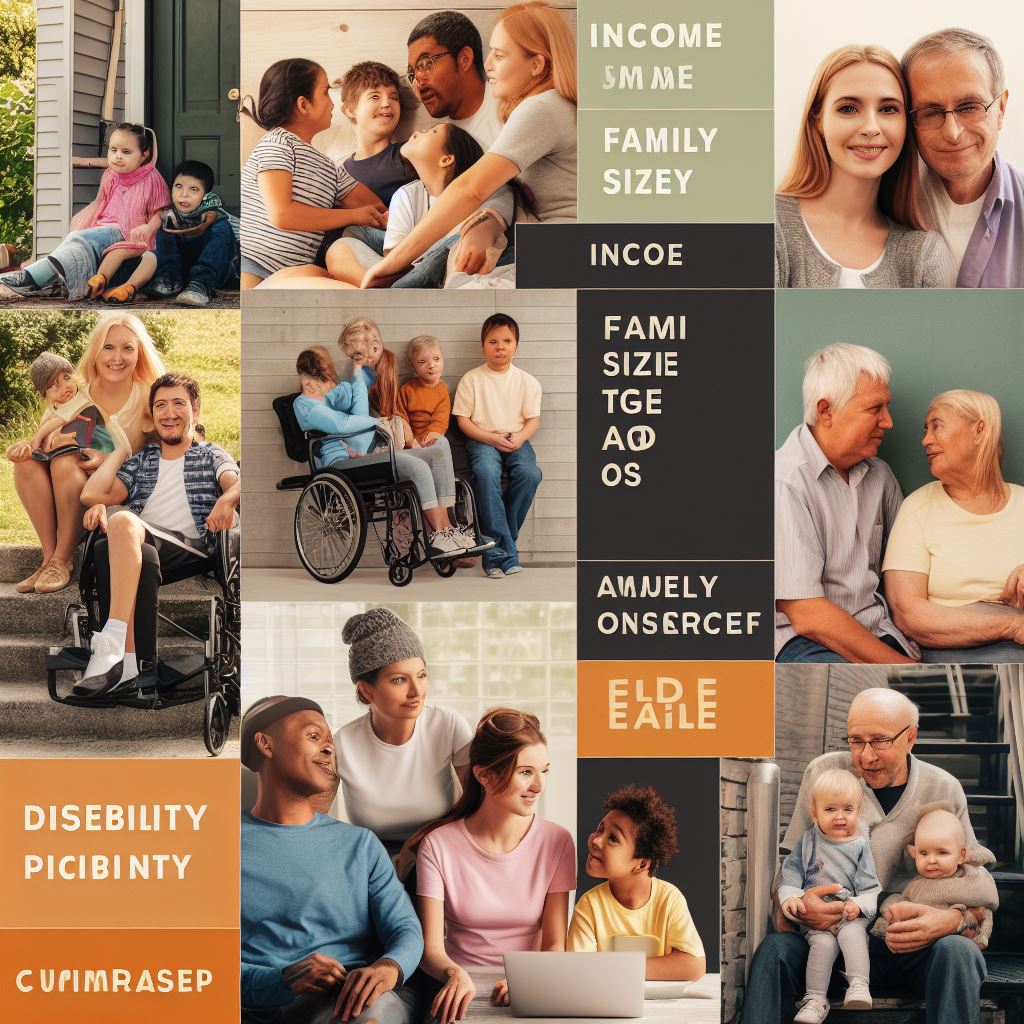11 Key Eligibility Factors for Section 8 Housing

Are you looking to qualify for Section 8 housing? Well, you’re in luck! In this article, we’ll explore the 11 key eligibility factors that you need to be aware of.
From income limits to citizenship requirements, rental history to criminal background checks, we’ve got you covered.
So, sit back, relax, and let’s dive into the world of Section 8 housing eligibility. You’ll be well-equipped with the knowledge you need to navigate the process successfully.
Key Takeaways
- Income limits for Section 8 housing eligibility vary based on location and household size, with larger households generally having higher income limits.
- U.S. citizenship or eligible immigrant status, along with documentation and a valid social security number, are required for Section 8 housing eligibility.
- Family composition is an important factor, with single person households, family households, elderly or disabled individuals, foster children, and non-related individuals all potentially eligible for Section 8 housing.
- Rental history, including positive rental history, eviction records, late rent payments, and damage to rental property, as well as criminal background, including criminal records and recent criminal activity, can impact Section 8 housing eligibility.
Income Limits
To determine your eligibility for Section 8 Housing, your income must fall within specific limits. The income limits for Section 8 Housing are determined by the U.S. Department of Housing and Urban Development (HUD) and vary depending on the location and size of your household. These income limits are calculated as a percentage of the area median income (AMI) and are updated annually to account for changes in the cost of living.
To qualify for Section 8 Housing, your income mustn’t exceed the maximum income limit set by HUD. The income limits are divided into three categories: extremely low-income, very low-income, and low-income. Extremely low-income households earn less than 30% of the AMI, very low-income households earn between 30% and 50% of the AMI, and low-income households earn between 50% and 80% of the AMI.
It is important to note that income limits may vary depending on the size of your household. Larger households generally have higher income limits compared to smaller households. Additionally, certain deductions may be applied to your income, such as medical expenses or child care expenses, which can help lower your income and increase your eligibility for Section 8 Housing.
To determine your eligibility based on income limits, you’ll need to provide documentation of your income, such as pay stubs, tax returns, and bank statements. It’s crucial to accurately report your income and provide all necessary documentation to ensure that you meet the income requirements for Section 8 Housing.
Citizenship Requirements
To be eligible for Section 8 Housing, you must meet certain citizenship requirements. These requirements ensure that individuals receiving assistance are legally allowed to reside in the United States. Here are the key citizenship requirements you need to know:
- U.S. Citizenship or Eligible Immigrant Status: To qualify for Section 8 Housing, you must be a U.S. citizen or have eligible immigrant status. This includes lawful permanent residents, refugees, and individuals granted asylum.
- Verification of Citizenship or Immigration Status: You’ll be required to provide documentation proving your citizenship or eligible immigrant status. This may include a U.S. passport, birth certificate, or immigration documents such as an alien registration card or I-94 arrival/departure record.
- Social Security Number: You must have a valid social security number for all household members. This is used for income verification and to ensure that benefits are accurately allocated.
Meeting these citizenship requirements is crucial for your Section 8 Housing eligibility. It’s important to gather the necessary documentation and ensure that all household members meet these criteria. By doing so, you can confidently apply for Section 8 Housing assistance and take advantage of the benefits it provides.
Family Composition
Your family composition plays a crucial role in determining your eligibility for Section 8 Housing. The U.S. Department of Housing and Urban Development (HUD) defines family composition as the individuals who’ll be living in the household. To qualify for Section 8 Housing, you must fall into one of the eligible categories of family composition.
The first eligible category is a single person household. This includes individuals who live alone and have no dependents.
The second category is a family household, which consists of two or more people related by blood, marriage, or adoption. This can include couples, parents and their children, or extended family members living together.
In addition to these categories, HUD also recognizes specific circumstances that may affect family composition. For example, elderly or disabled individuals may qualify as a separate category, even if they don’t meet the traditional definition of a family. Foster children and certain individuals who aren’t related to the head of household may also be considered part of the family composition.
It is important to note that the size of your family composition will impact the amount of assistance you’re eligible to receive. HUD determines the number of bedrooms needed based on the size and composition of the household.
Rental History
You need to have a positive rental history in order to be eligible for Section 8 Housing. Your rental history is an important factor that will be assessed when determining your eligibility for the program.
Here are three key points to consider regarding your rental history:
- Eviction records: If you have a history of eviction, it may negatively impact your eligibility for Section 8 Housing. Landlords want to ensure that tenants will pay their rent on time and follow the terms of their lease agreement. Therefore, if you have been evicted in the past, it may raise concerns about your ability to fulfill your rental obligations.
- Late rent payments: Consistently paying your rent late can also raise red flags during the eligibility assessment process. Landlords prefer tenants who are responsible and punctual with their rent payments. If you have a history of late payments, it may indicate financial instability or a lack of responsibility, which could adversely affect your chances of being approved for Section 8 Housing.
- Damage to rental property: If you have a record of causing significant damage to previous rental properties, it may impact your eligibility for Section 8 Housing. Landlords are wary of tenants who don’t take care of the property they rent and may be reluctant to rent to individuals who have a history of causing damage.
Having a positive rental history demonstrates your ability to be a responsible tenant. It’s important to maintain a good rental record by paying rent on time, respecting the property, and adhering to lease agreements to increase your chances of qualifying for Section 8 Housing.
Criminal Background Check
When it comes to Section 8 housing eligibility, one important factor to consider is the applicant’s criminal background. The presence of a criminal record can impact an individual’s eligibility for this program, as certain criminal offenses may disqualify them from receiving assistance.
However, it’s important to note that rehabilitation efforts are taken into account, and individuals who’ve made efforts to turn their lives around may still be considered eligible.
This raises questions about the fairness of using criminal background checks as a determining factor and the potential for discrimination based on past mistakes.
Impact on Eligibility
To determine your eligibility for Section 8 Housing, it’s important to understand the impact that a criminal background check can have. Here are three key points to consider:
- Criminal Convictions: If you or any member of your household has been convicted of certain crimes, it may affect your eligibility for Section 8 Housing. Serious offenses such as drug-related offenses, violent crimes, or crimes involving fraud can create barriers to approval.
- Recent Criminal Activity: Even if you have a criminal record, the recency of the offense is also taken into account. Recent criminal activity may raise concerns about your ability to maintain a safe and peaceful living environment for yourself and your neighbors.
- Rehabilitation Efforts: While a criminal record can impact your eligibility, demonstrating efforts towards rehabilitation and personal growth can be beneficial. This may include completion of counseling programs, employment, or participation in community service.
Understanding the impact of a criminal background check is crucial when applying for Section 8 Housing. It’s important to be aware of these factors and to provide any necessary documentation or evidence of rehabilitation to increase your chances of approval.
Rehabilitation Efforts Considered
After considering the impact of a criminal background check on your eligibility for Section 8 Housing, it’s important to understand how rehabilitation efforts can be taken into account.
The Department of Housing and Urban Development (HUD) acknowledges that individuals with criminal records face significant barriers when seeking affordable housing. However, they also recognize that rehabilitation is possible and should be considered when assessing eligibility for Section 8 Housing.
HUD encourages Public Housing Authorities (PHAs) to take into account the nature and severity of the offense, as well as the length of time since the conviction or completion of the sentence. This allows PHAs to evaluate the applicant’s rehabilitation efforts and determine whether they pose a risk to the community.
By considering rehabilitation, Section 8 Housing aims to provide opportunities for individuals with criminal backgrounds to reintegrate into society and secure stable housing.
Transitioning into the subsequent section about ‘fairness and discrimination’, it’s crucial to address concerns regarding the potential for bias in the application of criminal background checks.
Fairness and Discrimination?
Consider how a criminal background check can impact fairness and discrimination in Section 8 Housing eligibility.
While it’s crucial to ensure the safety and well-being of current residents, it’s also important to examine the potential for bias and unfair treatment that may arise from this practice. Here are three key points to consider:
- Disproportionate impact: Research has shown that criminal background checks often disproportionately affect minority communities, perpetuating systemic inequalities.
- Rehabilitation efforts: Many individuals with criminal records have made significant strides in their rehabilitation and deserve a fair chance to secure stable housing.
- Eviction rates: Imposing strict restrictions based on criminal history can lead to higher eviction rates, as individuals may be forced into unstable housing situations or become homeless.
Taking these factors into account, it’s essential to strike a balance between ensuring safety and promoting fairness in Section 8 Housing eligibility.
Now, let’s explore the age requirement for Section 8 Housing.
Age Requirement
You must meet the age requirement in order to be eligible for Section 8 Housing. The age requirement for Section 8 Housing varies depending on the specific program or housing authority. However, in general, applicants must be at least 18 years old to be considered. Some programs may have additional age restrictions, such as requiring applicants to be at least 62 years old or older. These age requirements are in place to ensure that the limited resources of Section 8 Housing are allocated to those who are most in need.
The age requirement serves as a way to prioritize assistance for vulnerable populations, such as the elderly or individuals with disabilities. It recognizes that these groups often face unique challenges in finding affordable housing and may have limited income or mobility. By setting specific age requirements, Section 8 Housing aims to provide targeted support to those who are most likely to benefit from the program.
It is important to note that age alone doesn’t guarantee eligibility for Section 8 Housing. Applicants must also meet other eligibility criteria, such as income limits and citizenship status. Additionally, there may be specific program requirements or preferences based on factors such as family size or composition. It’s advisable to consult with your local housing authority or program administrator to determine the specific age requirements and eligibility criteria for Section 8 Housing in your area.
Disability Status
To be eligible for Section 8 Housing, it’s important to consider your disability status. The program provides assistance to individuals with disabilities who have a low income and are in need of affordable housing.
Here are three key factors to consider regarding disability status and Section 8 Housing:
- Eligibility: To qualify as a person with a disability, you must have a physical or mental impairment that substantially limits one or more major life activities. This can include mobility, vision, hearing, or cognitive impairments. It’s important to provide documentation of your disability to the housing authority.
- Reasonable Accommodations: Section 8 Housing provides reasonable accommodations for individuals with disabilities. This can include modifications to the living space or common areas to ensure accessibility. It’s essential to communicate your specific needs to the housing authority during the application process.
- Disability Verification: You’ll need to provide proof of your disability, such as medical records, assessments, or letters from healthcare professionals. The housing authority may require additional documentation to determine your eligibility.
Considering your disability status is crucial when applying for Section 8 Housing. Once you have met the eligibility requirements and have provided the necessary documentation, the next step is to prove your homelessness, which we’ll discuss in the following section.
Proof of Homelessness
To determine eligibility for Section 8 Housing, you must provide documented evidence of your homelessness. This can include official records or letters from shelters or social service agencies confirming your stay.
Additionally, you may need to provide verification of your current living situation, such as a letter from a landlord stating that you’re homeless and living in temporary or inadequate housing.
Documented Homeless Individuals
A key eligibility factor for Section 8 Housing is providing documented proof of homelessness. This is crucial to ensure that individuals who are truly in need of housing assistance are prioritized.
To establish your eligibility as a documented homeless individual, you must provide the following:
- Proof of living in a shelter: This can be a letter from a shelter or a signed statement from the shelter’s representative confirming your stay.
- Documentation from a government or nonprofit organization: This could include a letter from a social worker, case manager, or homeless service provider stating that you’re homeless.
- Written verification from a support service agency: This may include a letter from a mental health provider, substance abuse treatment center, or domestic violence shelter.
By providing these forms of documentation, you can demonstrate your status as a homeless individual and meet the eligibility requirements for Section 8 Housing.
Now, let’s explore the option of using shelter stays as proof.
Shelter Stays as Proof
You can use a letter or signed statement from a shelter’s representative as proof of your shelter stay to establish your eligibility for Section 8 Housing.
Providing evidence of your shelter stay is crucial in demonstrating your homelessness and meeting one of the key eligibility factors for Section 8 Housing. This documentation serves as a tangible record of your time spent in a shelter and helps verify your need for subsidized housing.
When obtaining this proof, it’s essential to ensure that the letter or statement is on official letterhead and includes the shelter’s contact information, dates of your stay, and the signature of a representative.
This documentation should be submitted along with your application for Section 8 Housing to support your claim of homelessness and increase your chances of qualifying for this vital housing assistance program.
Verification of Living Situation
Establishing proof of homelessness is a crucial step in determining eligibility for Section 8 Housing, specifically in the verification of living situation. To ensure fairness and accuracy, the housing authorities require applicants to provide documentation that supports their claim of homelessness. Here are three key documents that can be used as proof:
- Shelter stays: Providing records of staying in emergency shelters or transitional housing can serve as strong evidence of homelessness. These documents should include dates, duration, and contact information of the shelter or housing facility.
- Letters from service providers: Obtaining letters from social workers, case managers, or other professionals who are familiar with your living situation can help validate your claim. These letters should detail your current housing circumstances and attest to your lack of a fixed, regular, and adequate nighttime residence.
- Affidavits from third parties: In some cases, individuals may not have access to the aforementioned documents. In such instances, affidavits from credible third parties, such as religious leaders, healthcare providers, or community organization representatives, can be used to verify your homelessness status.
Social Security Number Requirement
To apply for Section 8 Housing, you must have a valid Social Security Number. This requirement is in place to ensure that individuals receiving housing assistance are eligible and that their identities can be verified. The Social Security Number is a unique identifier issued by the Social Security Administration to U.S. citizens, permanent residents, and certain non-immigrant working individuals. It serves as a way to track earnings and monitor eligibility for various government programs, including Section 8 Housing.
By requiring a valid Social Security Number, the Department of Housing and Urban Development (HUD) aims to prevent fraud and ensure that assistance is provided to those who truly need it. This requirement helps to maintain the integrity of the Section 8 program and ensures that limited resources are allocated to eligible individuals and families.
When applying for Section 8 Housing, you’ll need to provide your Social Security Number along with other required documentation. The housing authority will verify the validity of your Social Security Number through the Social Security Administration. If your Social Security Number is found to be invalid or belongs to someone else, your application may be denied.
It is important to note that there are some exceptions to the Social Security Number requirement. Non-citizens who are eligible for Section 8 Housing may be able to provide an alternative form of identification, such as an Individual Taxpayer Identification Number (ITIN).
Compliance With Program Rules
Compliance with program rules is of utmost importance when it comes to Section 8 housing eligibility. To ensure that applicants meet the necessary criteria, a thorough verification process is carried out by the housing authority.
Non-compliance with program rules can have serious consequences, such as denial of assistance or termination of benefits, emphasizing the need to adhere to the regulations set forth by the program.
Rule Adherence Importance
How important is it to adhere to the rules of the Section 8 Housing program? It’s crucial to understand and comply with the program rules in order to maintain eligibility for Section 8 Housing assistance. Here are three reasons why rule adherence is of utmost importance:
- Continued Assistance: Failure to comply with program rules may result in the termination of your Section 8 Housing voucher, leaving you without the financial support you need for housing.
- Legal Consequences: Non-compliance can lead to legal repercussions, including fines and potential eviction from your subsidized housing unit.
- Program Integrity: Adhering to the rules ensures the program’s integrity and fairness, allowing assistance to be provided to those who genuinely need it.
By following the program rules, you not only safeguard your housing assistance but also contribute to maintaining the integrity of the Section 8 Housing program.
Now, let’s delve into the eligibility verification process.
Eligibility Verification Process
Ensure your compliance with the program rules by undergoing the eligibility verification process for Section 8 Housing. This process is crucial to determine if you meet the requirements set by the Housing and Urban Development (HUD) for the Section 8 program.
The verification process involves providing documentation and information related to your income, assets, household composition, and residency status. HUD will assess your eligibility based on these factors to determine if you qualify for Section 8 Housing assistance. It’s essential to be thorough and accurate when providing the required documentation, as any discrepancies or omissions may result in delays or potential denial of your application.
By complying with the eligibility verification process, you increase your chances of successfully obtaining Section 8 Housing assistance.
Failure to comply with the program rules can have serious consequences, which will be discussed in the subsequent section.
Consequences of Non-Compliance
To avoid potential consequences, it’s crucial that you comply with the program rules for Section 8 Housing. Failure to do so can result in serious implications that may impact your eligibility and participation in the program.
Here are three possible consequences of non-compliance:
- Termination of Assistance: If you fail to comply with the program rules, your Section 8 assistance may be terminated. This means you could lose the financial support provided by the program, making it difficult to afford housing.
- Ineligibility for Future Assistance: Non-compliance can also lead to being deemed ineligible for future Section 8 Housing assistance. This could hinder your ability to access affordable housing in the future.
- Legal Actions: In some cases, non-compliance can result in legal actions such as eviction or fines. These actions can have long-lasting consequences and negatively impact your housing and financial stability.
To avoid these potential repercussions, it’s essential to understand and adhere to the program rules. This includes providing accurate and timely information, attending required appointments, and fulfilling your responsibilities as a Section 8 Housing participant. Understanding the consequences of non-compliance underscores the importance of ensuring proper documentation for verification.
Documentation for Verification
Provide the necessary documents to verify your eligibility for Section 8 housing. Proper documentation is crucial in the application process as it helps determine your eligibility and ensures fairness in the allocation of resources.
To begin, you’ll need to provide proof of identity, such as a valid driver’s license or passport, to confirm your identity and citizenship status.
Additionally, you’ll need to submit documentation regarding your income, including pay stubs, bank statements, or tax returns. This information is essential to assess your financial situation and determine your eligibility for rental assistance.
You may also be required to provide proof of residency, such as a lease agreement or utility bills, to establish that you reside in the jurisdiction where you’re applying for Section 8 assistance.
Lastly, you’ll need to provide documentation regarding your family composition, including birth certificates or marriage certificates, to verify the number of individuals in your household.
Frequently Asked Questions
What Are the Specific Income Limits for Section 8 Housing in My Area?
You’re wondering about the specific income limits for Section 8 housing in your area. It’s important to consider these limits as they determine if you qualify for the program. Let’s find out more.
Are There Any Exceptions or Waivers to the Citizenship Requirements for Section 8 Housing?
Yes, there are exceptions or waivers to the citizenship requirements for Section 8 housing. However, without the context of Key Eligibility Factors, it is difficult to provide specific information.
Can I Apply for Section 8 Housing if I Have a Criminal Record?
Yes, you can apply for Section 8 housing even if you have a criminal record. However, certain criminal activities may disqualify you. The housing authority will consider the nature and severity of your offense.
Do I Need to Provide Proof of Homelessness in Order to Be Eligible for Section 8 Housing?
You don’t have to prove homelessness to be eligible for Section 8 housing. However, you must meet certain income requirements and other eligibility factors. Proof of homelessness may be required for certain housing programs.
What Types of Documentation Are Required to Verify My Eligibility for Section 8 Housing?
To verify your eligibility for Section 8 housing, you will need to provide documentation such as proof of income, identification, and citizenship status. These documents are necessary to determine your eligibility and ensure compliance with program requirements.



